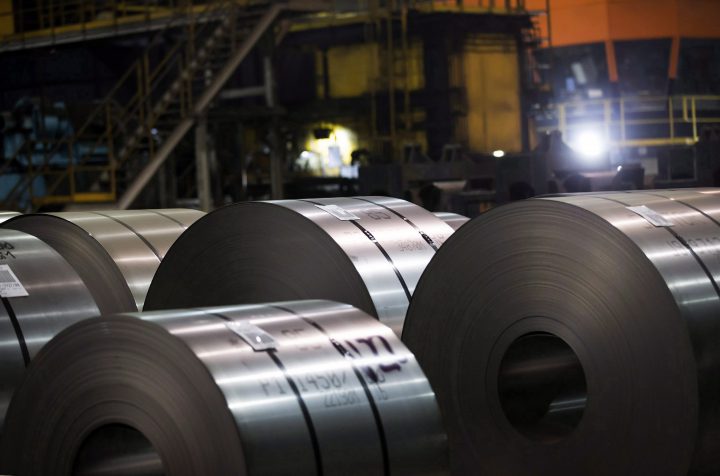A special program meant to help Canadian companies hit by retaliatory tariffs on steel and aluminum imports from the United States has started to roll out millions in relief money.

The government has relieved $110 million in surtaxes paid by companies between July 1 and Oct. 1, according to new figures from the Department of Finance. The relief comes as Ottawa reports collecting $438.5 million in the first three months after announcing retaliatory tariffs.
The remission of surcharges program was unveiled alongside the counter-tariffs last summer, but applications under the program had the unusual requirement of needing approval by cabinet.
There is no limit on how much money could be relieved through the program for companies that apply and meet the criteria for relief.
Canada Border Services Agency has also waived surtaxes amounting to $1.8 million under its existing duty deferral program and is considering other applications.
WATCH: How Canada’s tough counter-tariffs are affecting workers

Back in May, Canada put dollar-for-dollar levies on American products valued at $16.6 billion after U.S. President Donald Trump slapped tariffs on Canadian imports of steel and aluminum, citing national security. About 200 products were affected. Canadian officials tried to keep the list to products that have a substitute in Canada, as not all companies can source their supplies outside of the United States.

Get breaking National news
Enter the remissions of surcharges program. The program allows cabinet to consider “exceptional and compelling circumstances that, from a public policy perspective, are found to outweigh the primary rationale behind the application of duties, and in the current case, surtaxes.”
The funds are welcome news for Canadian manufacturers, according to their industry group.
“They are encouraged, but it is still very slow,” said Dennis Darby, president of the Canadian Manufacturers and Exporters. “For larger companies, they have the wherewithal to withstand this but for small companies, it is difficult.”
Darby added that small and medium-sized businesses have found the process complicated.
“The bottom line is if a manufacturer needs materials, they pay the duty on the way in and they carry that until they can find a way to get that back and some companies don’t have the cash flow to cover it,” Darby said.
Earlier this summer, multiple Canadian manufacturers told Global News they were frustrated by the wait to get the financial help they were promised.
Members of Parliament have been holding hearings into the impact of the steel and aluminum tariffs. Conservative trade critic Dean Allison said it is good to see more relief moving out the door, but he hopes more companies can access it.
“I’m worried about the mom and pops and people with 20, 40, 60, 100 people being able to get access to some of that funding,” he said. “We’re still hearing from people on an ongoing basis who say, ‘Listen, we really do need help.’”
While many Canadian manufacturers are looking for tariff relief, it is not the primary focus of Ottawa’s support for the steel and aluminum industry.
Ottawa made $2 billion available to affected companies through other federal programs. Export Development Canada and Business Development Canada received $1.7 billion for loans, but most is yet to be spent.
EDC has distributed $44 million since July, while BDC has authorized loans worth $131.5 million to 189 companies in the same time frame. A $250-million innovation fund has provided $49.9 million to ArcelorMittal Canada to modernize its facilities. Other funds have been set aside for work-sharing and the development of export opportunities.
“We are committed to making sure that every dollar raised in reciprocal tariffs is given back in the form of support for the affected sectors,” said Pierre-Olivier Herbert, spokesperson for Finance Minister Bill Morneau.
There had been hope that the steel and aluminum tariffs on both sides of the border would be lifted with the new free-trade deal. But the conclusion of negotiations on the United-States-Mexico-Canada Agreement did not remove the tariffs.
The Trudeau government has consistently said the national security justification for the tariffs is illegitimate. Foreign Affairs Minister Chrystia Freeland, as well as David McNaughton, Canada’s ambassador to Washington, are having continuing conversations with their American counterparts on the issue.
In an interview with CNN on Tuesday, Prime Minister Justin Trudeau reiterated his government’s desire to have the tariffs lifted.
“The tariffs on steel and aluminum are a continued frustration,” Trudeau told interviewer Poppy Harlow, who sat down with the prime minister Monday at the Fortune Most Powerful Women conference in Montreal.
Darby said he hopes Tuesday’s midterm elections in the United States will provide a window of opportunity to remove the tariffs and restore the integration of the industry.
“We’re not in a market where we can say there’s a wall between us — it just doesn’t make any sense,” he said.
— With files from The Canadian Press







Comments
Want to discuss? Please read our Commenting Policy first.